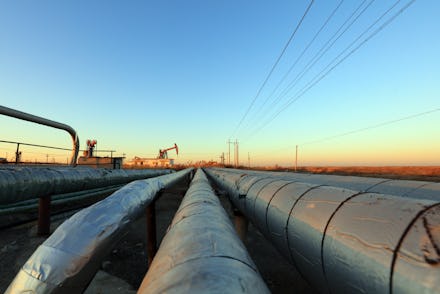Canadian indigenous land protectors were arrested, but they're not going away

Over 40 indigenous water protectors and non-indigenous activists were arrested in British Columbia and across Canada on Monday, during protests of a multibillion dollar natural gas pipeline that would run through unceded Wet’suwet’en Nation tribal land. Blockades shut down passenger and commercial railcars in Montreal and Vancouver, British Columbia, and additionally blocked traffic in Saskatchewan. Early Monday morning, police raided a ceremony to honor missing and murdered indigenous women, which led to several arrests. Among those taken into police custody were the matriarchs of the Unist'ot'en clan, one of five clans within the Wet'suwet'en Nation, as well as some prominent tribal leaders.
The gas pipeline in question would traverse 416 miles of British Columbia, bringing gas extracted near the city of Dawson Creek west to an export site in the coastal area of Kitimat. Land protectors — indigenous and tribal peoples who protect against various forms of resource extraction and other efforts to make money off indigenous land — say that the pipeline construction efforts and ensuing arrests are a violation of Canadian as well as international law, as outlined in the United Nations Declarations on the Rights of Indigenous Peoples (UNDRIP).
Land protectors further argue that the project violates traditional law of the Wet’suwet’en tribe. The company behind the $6.2 billion pipeline, CoastalGasLink, said it has the approval of elected tribal councils to build. But the hereditary chiefs of the Wet’suwet’en Nation refused to allow CoastalGasLink, which is owned by TC Energy (formerly known as TransCanada Energy), onto their land. When the company stated they were given permission from Wet’suwet’en band councils — five bands comprise the Wet’suwet’en Nation, and each one elects a council to oversee small parcels of land — the chiefs responded that they alone are able to give permission for such a project, and that they did not do so. This clash sparked the demonstrations Monday. (The Wet’suwet’en Nation did not immediately respond to Mic's request for comment).
Each Wet’suwet’en clan retains the right to control and occupy their territories because they never ceded the land to the Canadian government, per a press release Monday from the Unist'ot'en Camp. Land has religious, historical, and spiritual significance to indigenous and First Nations people, and the government's attempts to build on contested territory tap into a deep-seated tension in Canada. And even though British Columbia introduced a bill to uphold UNDRIP during its 2019 legislative session, few believe that policymakers will actually consider the resolution given that it was Prime Minister Justin Trudeau’s administration that approved pipeline expansion in the first place, hoping to work with oil and gas export businesses.
Land defenders have managed to hold off CoastalGasLink’s pipeline construction efforts for years, and Monday’s solidarity actions are the latest in a series of indigenous-led stand-offs between resource extraction companies and the first stewards of the land. Though Monday's police raid involved the use of heavy machinery, dogs, and helicopters, indigenous leaders say that they will continue to fight for the protection of their land.
Many activists supporting indigenous sovereignty have said that the Canadian government's efforts to support pipeline construction are part of a broader scheme to further diminish the social and political power of tribal nations. For example, activists say an interim land negotiation policy called Comprehensive Land Claims is explicitly built to “extinguish” the rights of indigenous people if they are not able to prove, by way of certificate or deed, their ownership and stewardship of the land.